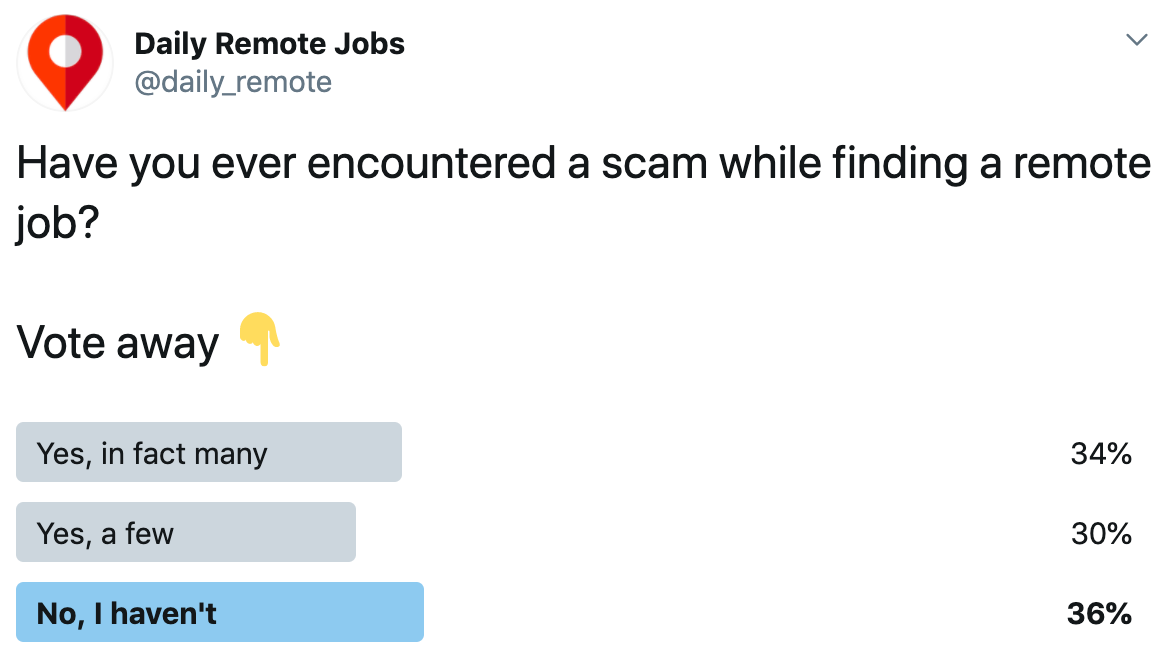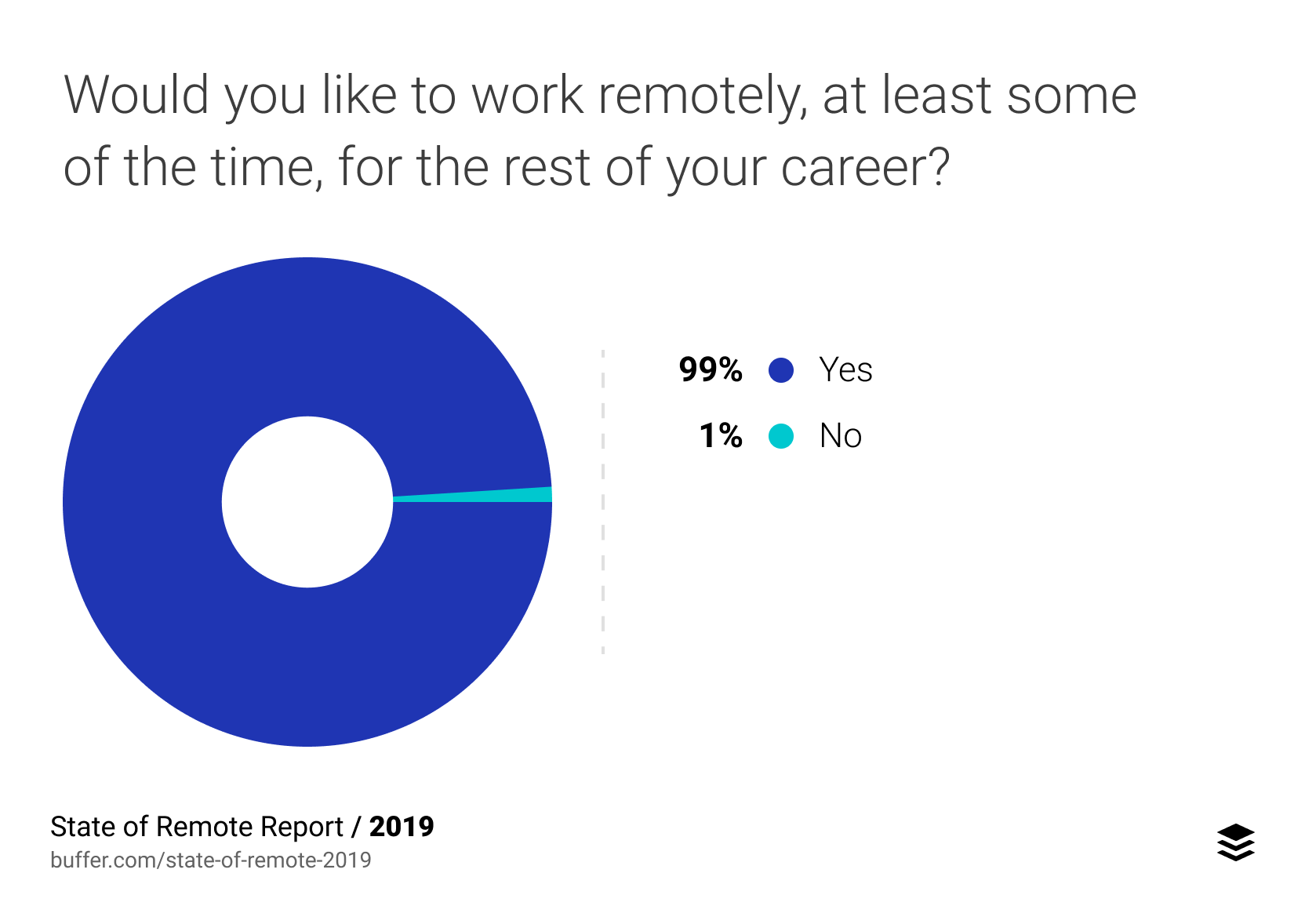Nearly 11 million people worked from their home 50% of the time in 2019. With so many professionals telecommuting, finding a legit remote job should be easy, right? Not necessarily.

While Twitter's consensus was with a "No," the amount of people who have encountered one or more scams is appalling. It's something that more and more people should be aware of.
The Federal Trade Commission received a whopping of 89,213 complaints involving telecommuting & remote jobs. As more and more people are going remote, it is getting easier for scammers to find more and more targets.
How to spot a scam in a work-at-home job?
There are a few things you can do to know if the job is unauthentic or illegitimate. You should know and be aware of all the red flags with any company.
Too good to be true
If the job seems to offer an outrageous amount of money for very little work, you should probably mark it as a scam. If you think the remote job they are offering is too good to be true, it probably is.
The scammer will try to sell you on the illegitimate job by acting all professional and genuine, but will not give you any proper details about the job.
The scammer might also give vague requirements for the job, that doesn't make much sense. So much so that even a fresh college graduate might be able to do it.
They reached out to you first
"We've seen your resume online, and you're a perfect match for the position we have open. Your skills perfectly align with what we're looking for in the candidate."

Of course, you are a talented person! But, apart from the flattery, there is no real crux in the message. They are offering you a position based on your resume and nothing else. It's a scheme to ambush you and catch you off guard.
The recruiter would try to reach out to you via email and try to give you a job without any interview. Be very cautious; don't get caught up in the scam for a shiny looking job with an excellent salary without enquiring about the job or the company first.
Again, not all recruiters reaching out to you are scammers. Just be extra cautious when moving forward in these situations.
Improper Job posts without a proper job description
A phony job post can be visible as soon as you cross it because of various spelling, grammatical, punctuation, and sentence formation mistakes. As the scammers don't have professionals to create error-proof job ads, anyone should easily be able to spot a spammy job ad from a mile away.
A proper job post should sound legitimate, authentic, and should have a company profile and email attached to it, even though it's a work-from-home job.
You should look out for the following qualities in a safe and real work-from-home job ad:
- Reasonable pay with a proper job title.
- The number of years of experience required.
- Qualities and skills required.
- Daily work and tasks to be performed.
- Professional email address. Gmail or Yahoo emails should trigger a red flag.
They asked financial and confidential information

Scammers might try to lure you into entering your personal and financial information for the promise of giving you a remote job. They would tempt the applicant to fill out information for a background check and direct them to a phishing website designed to steal the data.
Your personal and credit information may be used further for various frauds or even sent to the dark web. Fake work from home job ads might also steal your personal information via email, asking to fill out your data for starting the interview process.
Back off, if you are requested to enter the following information:
- Social Security Number
- Credit card details
- Bank account information
- Personal identity details
Use of generic emails such as Yahoo or Gmail
A job offer should be from a company account or company mail address and not a personal email address. It's the same for any job application submitted, as well. Also, you should be able to find information such as the company's physical address, phone number, and website at the end of the email or on their website.
If you have received an email for a job offer from a personal email address using Yahoo or Gmail, and can't find any information regarding company details in the email or anywhere on the web, you have probably been targeted by a scammer.
You can quickly identify by googling the email address and seeing any scam or fraud tags attached to it.
They ask to pay money before joining

If they asked you to pay money or give credit information to complete the hiring process or to land an interview, you have discovered a scam.
They might ask you to submit a fixed amount of deposit or be directed to a bogus website to enter your bank account details before they schedule your interview.
Scammers might also ask your bank account details by keeping you under the impression that they're going to transfer your salary there.
You may also be asked to transfer some training material, starter kit, resume review, or onboarding course fees to start your onboarding process and get you ready for the remote job.
Don't fall prey to such scams because you should NEVER have to pay any money to get a telecommuting job or land an interview. Any job that requires you pay a fee to get the job should be an immediate red flag
You are offered the job immediately without verifying your details
If a potential employer cares very little about your qualifications and skills, they probably aren't genuine. Scammers will try to offer you a remote job even without taking a proper interview or analyzing your qualifications and fit with the company.
A real and legitimate telecommute job will always include a proper process for hiring, including but not limited to, submitting a job application with an appropriate cover letter. In a remote job, proper background check plays an essential role for any company, before offering a remote position.
If you don't see any of this happening, and the person is still offering a remote job with great pay and little or no work, be aware.

You don't see or talk to a real person
A legitimate company will NEVER contact you via Facebook Messenger or any other online chats to offer you a job. If you don't do a video interview or don't talk to a real person and they are still offering you a remote position, then that's a sign that you are going to get scammed.
If you don't give an interview, don't see or talk to an actual human, then there is no "real" connection with the company. It's just empty emails. If you can't find any information about the company on LinkedIn or Twitter, then it's a major red flag for fraud.
The scammers will offer you a remote job and try to pressure you to accept as early as possible so that you can't inquire about the position. DON'T fell prey to such scams, instead confirm thoroughly about the company before accepting an offer.
And, you can always check the most authoritative list of all the common scams you should be aware of.
How to know if the company is real?
There is a simple way to know if the company is indeed legitimate or not. You can leverage existing reviews reported about the company's operations, and it's remote work culture.
All you need to do is go to the Google search and type in a query like:
- "Company Name" reviews
- "Company Name" complaints
- "Company Name" scam
You can see an example Google query here.
This will give you all the instances of the company indulging in illegal activities. This should be a good starting point for you. We highly recommend you not to move forward in case you find even a single red flag while researching.
How to find a legit work-from-home job?
Remote work is not just a trend; it is the future.
According to Buffer, when surveyed, 99% of people said they would like to work at least some of the time remotely for the rest of their careers.

Searching a safe and real work at home is not that hard, avoid making mistakes while applying for a remote job and just be cautious before accepting an offer from any company:
- Check the company's contact information, including phone number and physical address.
- Go through their website, LinkedIn, and other social media accounts.
- See the company's reviews and ratings on Glassdoor.
- Any news, funding updates, and press coverage about the company.
- Try to network and interact with the existing employees of the company.
- Ask them for a video call interview, don't trust a facebook message or online chat.
- NEVER pay money upfront for the interview.
Finally, the best way to avoid scams is to search jobs on legitimate job sites and boards.
DailyRemote is a widely trusted remote job board and only lists legitimate and real work at home jobs. All of the jobs on our site are highly vetted, safe, and maintains a quality standard. We only list jobs that we're confident are from respected and well-known startups.
How to report a scam?
If you have spent money and time on a work-at-home program and now believe it might not be legitimate, contact the company and ask for a refund. Let company representatives know that you plan to notify law enforcement officials about your experience. If you can't resolve the dispute with the company, file a complaint with:
- The FTC at ftc.gov/complaint or 1-877-FTC-HELP (1-877-382-4357).
- The Attorney General's office in your state or the state where the company is located. Find yours at naag.org. The office can tell you if you're protected by a state law that regulates work-at-home programs.
- The advertising manager of the publication that ran the ad. The manager may be interested to learn about the problems you've had with the company.
- Find the official company name, hire an attorney, and file a lawsuit against them.
- Check with your Local Consumer Protection Agency.

If you're still not sure, check the company in the Better Business Bureau (BBB) to find out whether there have been complaints and whether the company has an unsatisfactory record with the Bureau(BBB). Also, the Federal Trade Commission (FTC) provides information on commission actions.
If you see a phishing scam and the company has taken money from you, report it to Internet Crime Complaint Center.
If you were fooled, don't sit idle. Take action. File a report.
You can also reach out to us on contact@dailyremote.com if you ever want to report a company that indulges in such activities.

